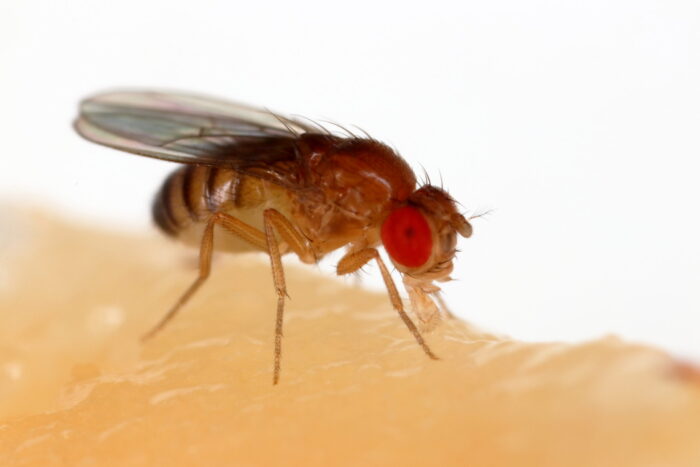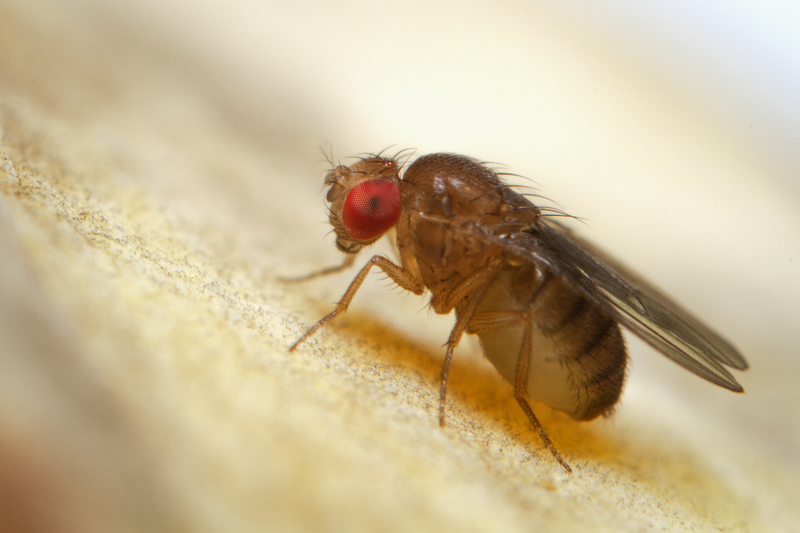May 6 to 21 is Science Odyssey, a celebration of all things science! OWLconnected is recognizing this two-week event with lots of science content, as well as with an amazing contest, presented by our friends at the Natural Sciences and Engineering Research Council of Canada (NSERC). Details are at the end of this post—be sure to enter!
Okay, this one is maybe a bit unusual for the type of science that we discuss on this site. But bear with us, because the overall message is something that we think is really cool.
Especially during Science Odyssey!
First, here's the headline ...

The fruit fly is ready for its closeup. (Wikimedia Commons)
Recently, researchers at the Harvard Medical School made an accidental discovery. While working with fruit flies, they discovered an entirely new organelle within the animal.
An organelle is a subcellular structure that performs a specific task to help keep a cell alive and functioning. In other words, it does the same thing for a cell that an organ (like the heart, lungs, liver, kidneys, or stomach) does for a larger complex organism. Neat!
In this case, the newly found organelle regulates (controls) phosphates within the cell. Phosphates are used to help create DNA, cell membranes (walls), and, in larger creatures like us, bones and teeth. This made finding this organelle, called a PXo body, really intriguing for experts who are dedicated to understanding how these animals function.
But, as we were saying, it's maybe not the most exciting news for the average person. A tiny organelle inside the cell of one of the smallest flies on Earth? How does that matter to you and me?
Because this breakthrough proves that there is always something new to discover! Allow us to explain ...
A model organism
You might be surprised to know this, but fruit flies are one of the most studied animals on Earth.
They are what is known as a model organism.
They share about 75 percent of disease-causing genes with humans. At the same time, their genome (genetic blueprint) is super simple compared to a human's, making it easier to understand and examine at a glance. They breed (make new babies) and grow up super fast. And they are cheap to care for.
This makes them an ideal test subject for medical research, where they have been studied thoroughly for well over a century. And we do mean thoroughly.
Want proof? Check out this video from NASA showing why fruit flies are so important to research on the International Space Station!
See? These little critters are a big deal!
So much left to learn
And according to Chiwei Xu, who worked on the study, this discovery is a reminder of how much there still is to learn about not just fruit flies, but all creatures. "In terms of intracellular regulation of phosphate [in animals], very little is known," he wrote in his report on the study.
Still, so many experts are blown away that something like this could've escaped our notice for so long. In LiveScience, Queen's University's Laurent Seroude said, "it's quite amazing that, in model organisms, we are still discovering things every day that nobody suspected before."
And if this organelle is in the fruit fly, he went on to say, it could easily be waiting to be discovered in other species, too.
Just a reminder to all of you future researchers out there: In the world of science, there is always something new to discover!
Contest alert
Don't forget to enter the Science Odyssey Contest! CLICK HERE TO ENTER.

 Meet one of the most researched animals on the planet: the fruit fly. (ID 196715461 © Whitepointer | Dreamstime.com)
Meet one of the most researched animals on the planet: the fruit fly. (ID 196715461 © Whitepointer | Dreamstime.com)









